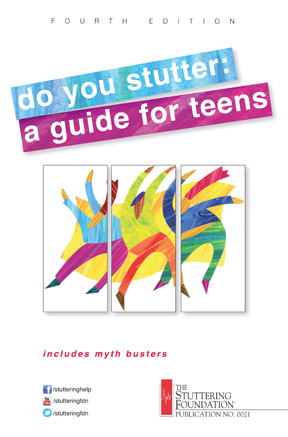This excerpt is Chapter Five in the book Do You Stutter: A Guide for Teens
By Lois A. Nelson, Ph.D.
Friendships don’t just happen. Most need some care if they are to develop into that special kind where you each feel important and worthwhile. You want your thoughts and feelings to be respected and held in confidence and your friends want you to do the same.
How does a friendship get started? After all, you stutter and feel that that makes a big difference. If you’ve had a close friend all your life, someone you grew up with, that’s great. But what if your family moved? How do you meet someone? If you stutter, you may be hesitant to make the first move. You remember from past experience that when you are trying hard not to stutter, you probably will. You worry that the way your stuttering sounds and looks will turn off potential friends and make you feel embarrassed.
It’s easier to get acquainted with others if you share common interests. It’s easier to put stuttering in the background if you can focus on something else. Ask yourself what you do during your free time. Is there a sport or hobby you’re good at? Is there a talent you can develop? Focus on your strengths and let them outweigh your weaknesses.
To some friends, the stuttering you do makes no difference. They treat you the same whether or not you speak fluently. Your own attitude sets the tone for their reaction. If you don’t appear too bothered, chances are they won’t either.
But what happens if other friends look away when you stutter or answer the question before you even finish asking it? It hurts when people you have counted on for support are bothered by your stuttering. But unless you tell them, they can’t really know what stuttering is like.
Do They Try to Protect You?
Do you wonder if your friends are disappointed or embarrassed when you stutter? It’s easy to get that impression if they answer for you or intervene so that you can get by with talking very little. Probably they’re just trying to help.
Take a closer look. Why are they trying to protect you? Do they think they are doing you a favor? Resist that kind of favor if you can. Although it may seem easier right now when they run interference for you, their protection puts off your doing what you need to do for yourself—to talk.
Suppose you’re not ready to ask your friends to let you talk for yourself. You’re not sure you can handle it and you’re not sure how they will react when you ask them. Telling them may be taking a risk but maybe not as big a risk as you think. In the long run, it’s better for you to talk and stutter—but to talk for yourself—than it is for you to keep silent and feel lousy.
Who Orders the Cokes?
Do you chime in with “same here” or nod in agreement even though you’d rather have something different to eat or drink? Friends are likely to understand what it’s like to avoid something that is scary or embarrassing and not push you to talk for yourself. They may also be puzzled about how saying a few words can be so difficult for anyone.
You probably feel pressured to give your order quickly and think you only have one chance to do it right. This situation can be very frustrating if you’re not the boss of your mouth or your head. If you are uptight about making a mistake in talking, you probably will. Worry can have a negative effect on anyone. Feeling scared affects how our bodies work. A star athlete may miss the free throw that the basketball teams needs to win the game if he feels pressured and if he lets that pressure get to him. You may miss the basket. You may stutter. But you can learn, with help from a speech pathologist, to resist pressure to speak quickly. You can learn to talk more smoothly — if that’s important enough to you.






 Podcast
Podcast Sign Up
Sign Up Virtual Learning
Virtual Learning Online CEUs
Online CEUs Streaming Video Library
Streaming Video Library